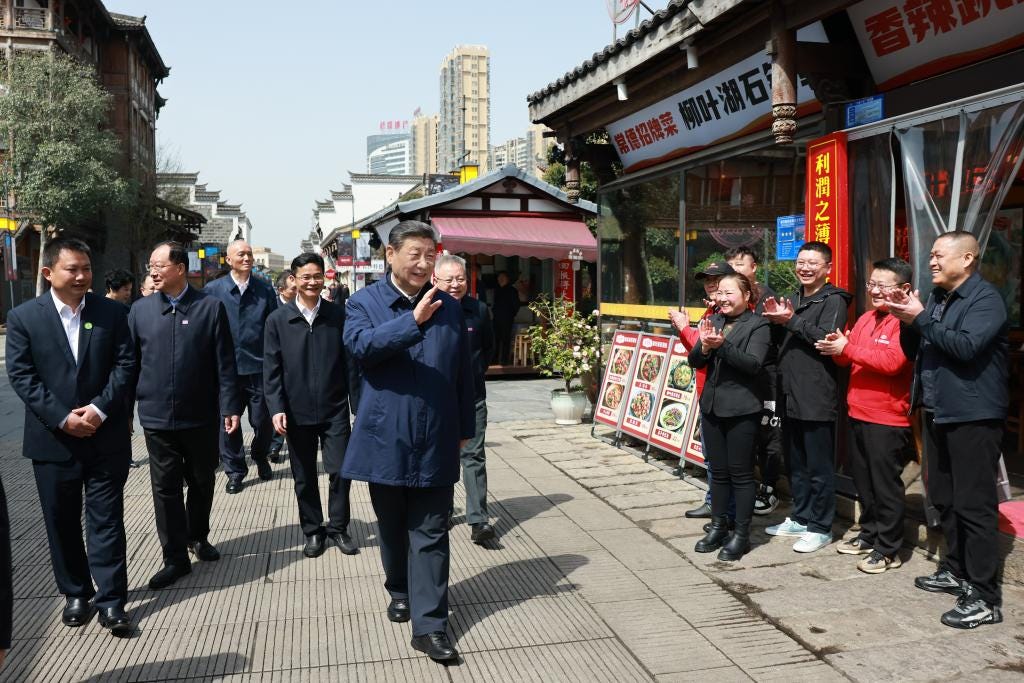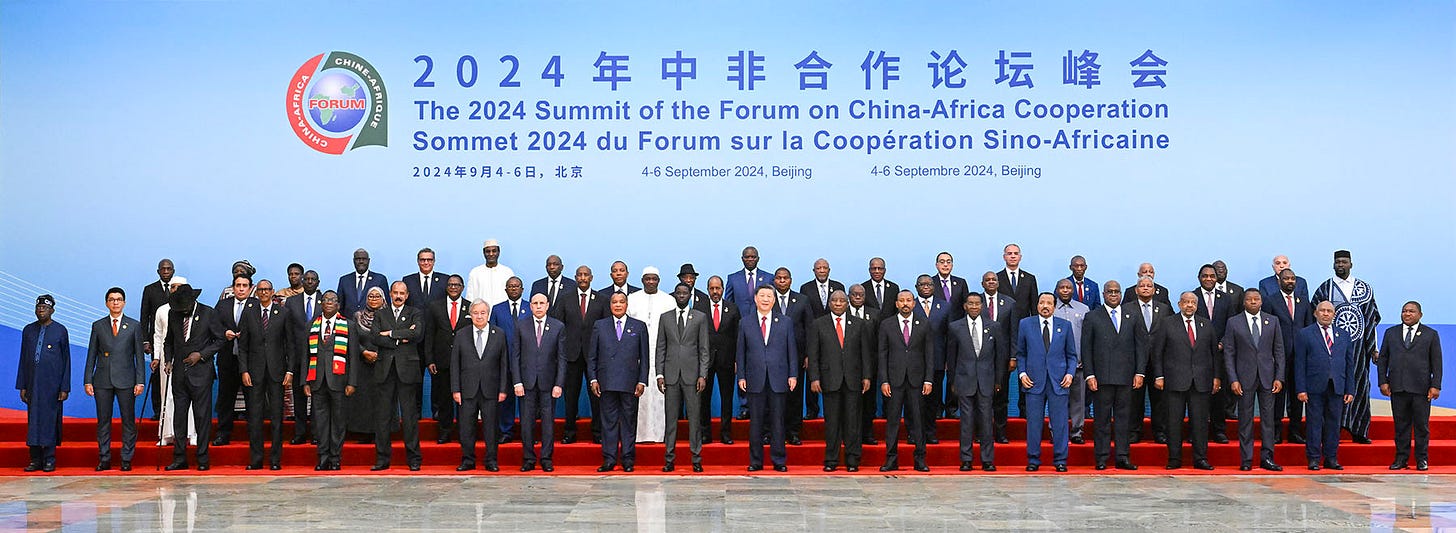JPM, Work for Us, IP
, ChinaTalk’s chief biotech correspondent, will be at JPM next week and would love to meet up. Respond to this email to connect.You could cover AI for ChinaTalk full time this year courtesy of The Tarbell Center for AI Journalism. Apply for the fellowship here — applications are due February 28.
Lastly, next week we’re diving deep into China and IP coming up with Adam Mossoff, a professor of law at GMU. A sneak peek:
What Xi Believes
Lizzi C. Lee is a fellow on Chinese Economy at Asia Society Policy Institute’s Center for China Analysis and the host of Wall St TV.
Reading the full text of Xi Jinping’s February 2023 speech — published on the last day of 2024, almost two years later, in Qiushi 求是 — isn’t how I expected to welcome the new year. It’s dense, grandiose, and filled with Marxist-Leninist jargon that demands a machete to cut through. This speech is vintage Xi — equal parts ideological lecture, historical justification, and political directive. It’s also the clearest articulation we’ve had of his vision for “Chinese-style modernization” 中国式现代化. And, as always with Xi, there’s no shortage of sharp critiques, bold ambitions, and ominous warnings.
Modernization, Xi-Style
Xi’s pitch is simple: modernization doesn’t have to follow the Western script. In fact, it shouldn’t. He blames Western modernization for prioritizing capital over people, resulting in runaway inequality, entrenched social divisions, and political instability. For Xi, this isn’t just a bug in the system — it’s the system’s defining feature.
Chinese modernization, he says, is different. It’s “people-centered,” aiming for a balance between material wealth and spiritual well-being. It’s a model designed to suit China’s history, culture, and governance system — not a one-size-fits-all approach borrowed from the West. And Xi doesn’t stop there: he frames it as a beacon for other developing nations, a way out of the “middle-income trap” that has snared so many others.
This might resonate with some, especially in a world where the Western model has lost some of its sheen. The problem lies in the art of the word balance. Xi’s model relies on the very market mechanisms he criticizes. For all his railing against capital, the Chinese economy still leans heavily on private enterprises, foreign investment, and global trade. Xi wants to avoid the pitfalls of capitalism while using its tools to fuel growth. If anything, his tendency to clamp down too much risks suffocating the economic dynamism he seeks to safeguard, embedding even more vulnerabilities into the system. That balancing act — rejecting Western modernity while borrowing liberally from it — is harder to achieve in practice.
The Party: Soulkeeper and Savior
If there’s one thing Xi makes clear, it’s that the Party is non-negotiable. Without the CCP, he says, Chinese modernization would “lose its soul” 丧失灵魂. That’s heavy stuff, and it underlines how deeply he ties the Party’s leadership to the nation’s success — or failure. Party leadership isn’t just important — it’s existential. Xi warns that losing the Party’s grip would spell doom for the entire project.
Interestingly, Xi seems clear-eyed about the challenges within his own ranks. He talks about the “deep-rooted problems” 深层次问题 that still plague the Party — issues that, if left unchecked, could stage a comeback. His warning is blunt: any lapse in discipline could let old problems “resurface like embers reigniting” 死灰复燃. This seems to reflect the constant tension within the Party to maintain control, enforce discipline, and keep its sprawling apparatus from falling into complacency.

Xi’s disdain for procrastination is striking. “See risks early, act quickly, make decisive calls” 见事早、行动快,当断则断、当机立断, he demands. And the language here is truly explosive (pun intended!): “Act decisively when action is needed; make bold, swift decisions. Don’t let small problems grow into big ones, or big problems explode” 当断则断、当机立断,不能让小事拖大、大事拖炸. The message is clear: inaction is dangerous, and delay is unforgivable. It’s the kind of directive that might inspire action — or strike terror — depending on where you sit in the Party hierarchy.
Lean Into the Struggle
If there’s one word that defines Xi’s speech, it’s struggle 斗争. He frames it as the CCP’s defining trait, a “political gene” forged through a century of adversity.
Struggle isn’t just a strategy for Xi — it’s practically a moral imperative. He frames it as the CCP’s key to its past victories and future survival. “Weakness” and “retreat,” he argues, lead only to decline. It’s a stark, almost combative philosophy, underpinned by his conviction that China’s path is righteous and its rise inevitable.
When it comes to cultivating young leaders, Xi is equally unsentimental. He wants cadres forged in the fire of practice and struggle. His metaphor of choice? “Let cadres, especially young ones, learn to swim by swimming” 在游泳中学会游泳. The best way to spot capable leaders, he suggests, is to see who thrives in “severe and complex struggles” 严峻复杂的斗争.
But this obsession with struggle reveals as much about Xi’s insecurities as it does about his ambitions. [JS: he must see lazy cadres all the time whose hearts aren’t in the fight.] China’s rise, he acknowledges, is fraught with risks: economic pressures, geopolitical tensions, and internal dissent. Xi’s solution is to double down on the fight, whether it’s against foreign “containment,” domestic inefficiencies, or ideological wavering within the Party.
And here’s the irony: a system that constantly defines itself through struggle risks becoming trapped in a self-perpetuating cycle of conflict. Xi’s insistence on vigilance — his warning to cadres to “act decisively” and prevent “small risks from escalating into major crises” — sounds less like confidence and more like paranoia. It’s as if he’s bracing for a storm that never arrives but always looms on the horizon.
The West as the Convenient Villain
Xi’s critique of the West is one of the speech’s sharpest elements — and also one of its most revealing. He accuses Western modernization of being inherently exploitative, built on colonialism, inequality, and capital-driven greed. But Xi goes further, taking aim at what he calls the “myth” that modernization equals Westernization.
By positioning Chinese modernization as a viable and increasingly appealing alternative, he not only defends China’s path but also offers it as a model for other nations — though, as Xi claims, China won’t force it on others.
Of course, the focus of this messaging is other developing countries. In fact, Xi portrays China’s model not just as an alternative but as an improvement to the Western system, which he accuses of failing those who tried to copy it. It’s a not-so-subtle attempt to redefine modernization itself — and to shift the narrative away from Western dominance.
And while Xi rails against Western-style inequality, China’s own wealth gap remains an uncomfortable reality. The promise of “common prosperity” has been toned down in recent years, given economic malaise and the seemingly more urgent need to revive the animal spirits of the business community. Yet another reminder of how fast China can pivot (and how long the time delay of the Qiushi article is!).
Can Xi Deliver?
Xi’s speech is a declaration of ideological intent. It frames Chinese modernization as a project of historic significance, tied to the Party’s legitimacy, China’s rise, and even global civilization itself. It’s ambitious, audacious, and, yes, a little overwhelming. My main issue, though, is whether his vision is genuinely achievable. The message boils down to: “Do everything, perfectly, all at once.” It’s an impossible standard that Xi holds himself to. He wants to combine market efficiency with socialist equity, preserve environmental sustainability while driving industrial growth, and project confidence while guarding against constant threats. It’s a lot to ask of any system, let alone one as complex and unwieldy as China’s.
Some might say that the competing priorities and contradictions may not be a bug but a feature. Like many Party documents, it attempts to cover every conceivable issue with sweeping mandates, but it leaves room for both ideological purity and pragmatic flexibility to adapt to changing circumstances. But Xi goes a step further. What is clear to me is that Xi isn’t just trying to reshape China. He’s trying to reshape the very idea of modernity itself.
Back to the topic of ideology and practicality, I do believe, though, compared with Xi’s predecessors, he is less about paying lip service to ideological purity and is actually a man of deep conviction in such beliefs — but that’s a topic for another day.




Listening to Xi talk about struggle and decisive action while bopping Win&Lose by Chinese Football…or hell, trying to hold onto the vibe of a Howie Lee track…I can understand why Xi would be nervous.
The Chinese of my twentysomething age cohort do NOT seem on board.
My best way of contextualizing this is, what if a series of madmen had for 75 years fed the Chinese people on nothing but unflavored congee and then periodically screamed at them about how nuanced the flavor was and how important it was for them to eat it all and praise the recipe of the current chef.